– Reportage from a window near the walls of the embassies –
Memorie.al / From July 2 – the day and night of the harsh repression of the dictatorship machine, on those who dared to express opposition to the “socialist” trends, to July 5, when our state allowed the crossing of the walls of the embassies and the exit of refugees from the country. 35 years have already passed since the massive entry of people into the foreign embassies in Tirana, especially the German and Italian ones, and the events have begun to blur. Those were days when no one could guess what tomorrow would bring and only one thing was known for sure: the Berlin Wall had fallen; the entire Eastern Empire had collapsed, while the countries of the former Socialist Camp of Europe had all gone from single-partyism to a pluralist political system.
We were the only ones left, continuing to writhe in the strait of our world, isolated, shrouded in the darkness of lack of information. The official media pretended as if nothing was happening in the country and tried to cover up the extraordinary events with propaganda and disinformation. From July 2 – the day and night of the dictatorship’s machine’s harsh repression of those who dared to express opposition to the “socialist” trends, to July 5 when our state allowed the crossing of embassy walls and until the refugees left the country, protected by the diplomacy of these states, two weeks passed of hopes for change and disappointments, of words spread by word of mouth and, of denials.
Then, the “right” accused the state of the Party of Labor, that with the events of July 2, it had wanted to invalidate what was happening in Kosovo in the meantime and precisely the adoption of the Constitutional Declaration by the Assembly of Kosovo, which on July 2, 1990, declared Kosovo a separate unit, within the then Yugoslav federation, a necessary step before the declaration of independence. To complete the knowledge about the atmosphere of that time, perhaps these notes kept on those hot July days would also serve. The author ran the “Mitrush Kuteli” Publishing House, as one of the heirs of the work of the writer Dhimitër Pasko. At the time when this diary was kept, she worked as an editing director at the “Shqipëria e Re” Film Studio.
Monday, July 2, 1990, 11 p.m.
Apparently, this year’s July is coming with great events. Yesterday and today, I saw (from the window) things that I would like to keep in my memory, as I have them now. That is why I am sitting down to write them down, in this time that remains to me from work and from the World Cup. Last night, on the first day of July, at 10:20 p.m., in the second half of the England-Cameroon match, suddenly, very close, a revolver shot is heard. After it, other shots coming from the back wall of the German Embassy. I raise the curtain of the room window and look through the darkness at alarmed civilians running down the alley towards the “German wall”.
From the window of the annex, where my husband, Gjergji, is smoking a cigarette, I see something else: inside the embassy courtyard, some young people, among whom is a girl with long, straight hair, run up the steps of the “Germans'” veranda and disappear behind a door. The veranda light, which had been on, went out. After a few seconds, two others also climb the steps, holding a third by the arm. This one looks wounded. Together with them, the Germans, who, as Gjergji told me, had been watching the match on the veranda, disappeared behind the door.
What had happened?
A lumberjack truck had come rushing from “Gjon Muzaka” Street and had crashed into the German wall, but had not been able to collapse it. Some 10-15 young people, who were said to have been lying on the bodywork, were thrown inside the wall, along with the driver who, as they said, had been wounded by a policeman guarding the wall. It is not known what happened to the others. Some say they were caught, some say they escaped…?!
This morning, July 2, at work (Kinostudio “Shqipëria e Re”) I learned about a group of people who had entered the Turkish embassy with a garbage truck. Others said about some wedding guests who, after finishing the wedding, had entered the Turkish embassy. Apparently it was the same event…?! In the afternoon, around 7:10 p.m., as we were getting ready to leave the house, we suddenly heard a loud noise: something crashed, something collapsed, then a car braked and a terrible silence.
Only a few seconds of silence, then a long o-o-o of joy. Some people ran up the back steps of the German Embassy, and then stood on the railings of the veranda to greet those who were watching them from the windows of the surrounding houses, as well as the crowd that had already gathered near the building of Ward No. 9. This crowd, which the police could barely contain, unable to do anything else, burst into applause, in response to those on the veranda.
I watched all this from the window of the annex, with Ana, who was almost three years old, in my arms, with tearful eyes and sobbing. But why sobbing? Perhaps because of the great danger that had threatened people…! Or because someone had finally found the courage to act against the strict rules of the state, which still tries to convince us (with difficulty) that no one in the world lives better than us. After a while I got out and got a closer look at the place: the car had completely entered the embassy wall, after having run over a pile of iron bars that the police (?) had placed in front of it to block the road. (Surprisingly, the old “Gjon Muzaka” Street had not been occupied by that “Zisi” that had been parked a few meters away from the wall of the German Embassy for several days, neither last night nor today!)
It was said that there had been over 30 people in the car, not only young people, but also men and women with children. They also said that they had been accompanied by a ram, which they hoped would become a snack before reaching Germany (it is said that it was the night of Kurban Bayram). When we went out on “Kavaja” Street (the three of us: Gjergji, Ana and me), for our afternoon walk, we saw a large crowd of curious people that the police were not letting enter “Skënderbej” Street (the street where the embassies are located). The parade that usually takes place on the Grand Boulevard has been moved to “Kavajës” Street (which should officially be called “Pezës Conference”). People have a special light on their faces. Their eyes sparkle.
How different these eyes are from the eyes of that old woman near Ward No. 9, who accused the police today of why they “allow people to look and rejoice” at those others who broke through the embassy wall. We return home quickly, around 8:30 p.m. We have learned about another car that entered the Italian Embassy today, after dinner. The first one entered a couple of weeks ago, loaded with 5-6 people. Today they said there were about 15 people. The series of cars attacking the walls of embassies was opened by an “accordion” bus, one of the ones from Shkodra that kissed the wall of the Greek Embassy three weeks ago, one morning around 8:15.
There were only two people inside (one was the driver, who after bringing the bus at speed to the Greek wall, passing through “Frederik Shiroka” Street where no bus line passes, stopped just as quickly, upon touching the wall. Then, together with his friend, they jumped the Greek wall in a few seconds, after boarding the bus from a hatch that opened almost above the driver’s seat. When we were returning home, I saw that the police “Gaz” that had been blocking “Frederik Shiroka” Street for several days, located in the middle of it, had tonight moved near the 4-story building, opposite the Greek Embassy, leaving the road free. This also impressed Gjergj, but we didn’t have time to comment for long. Around 9:30 PM, when I was feeding Ana, we heard a loud noise and a huge commotion.
We open the curtain and look at the wall of the Greek Embassy broken by a “Skoda” that had entered it sideways and now stands in the dust and smoke, divided lengthwise: the right half in “Greece”, the left half in Albania. 10-15 people jump from the car body into “Greece” attack the nearest building of the three embassy villas, fall with force through the metal door, a few meters from the wall. I don’t know why one, instead of jumping into “Greece”, fell into “Albania” (perhaps one of the “guards of the wall” pulled him). He ran towards the darkness through some tall grass in a barren field, behind our building.
A civilian policeman was chasing him, who, running and cursing loudly at his mother…! Perhaps if he hadn’t wasted his energy on cursing, he would have caught up with him. Fortunately, it happened this way and not otherwise: the policeman ran and cursed, the boy just ran (I call it that because of the running he did, because all these things happened so quickly, then it was dusk and the faces were hard to see). In front of the broken wall, people gather and silently watch what is happening 10 meters away. They watch, as if watching a movie, with the solemnity created by the distance from the screen, where the actors are playing…!
Selime, with a cigarette in her hand, searches in terror for her only son, 27 years old, a father of three. She moves among the people with her son’s name in her mouth and does not notice that he is about three meters away. He himself is lost in thought and has no time to answer her…! Suddenly, the crowd comes alive: some kids shout, get together; o-o-op, they suddenly jump beyond the collapsed wall and the police are caught by surprise and are unable to stop them. Then the police and civilians together push the people away from the wall. These, angry, retreat about 20-30 meters, until they encounter two piles of stones and bricks, where a house is being built on the side of the road. The stones and bricks become weapons and civilians and policemen run with sticks in their hands, all trying to hide behind a concrete pillar. Along with the stones and bricks, many dirty curses fly from both directions.
As soon as the situation calms down (the curious people leave one after another), a policeman comes running: “Quickly, from the other side”! From the other side, meaning “Gjon Muzaka” Street, which is closed by the wall of the German Embassy, which was breached two hours ago. Immediately, there are explosions, a real fight. The crowd that the police had removed from the Greek wall has attacked the German wall. The neighbors say that some got through, some were caught, and others got scared and ran away. The Germans come out on the porch and shout: “Nicht, nicht”, which we understand as: “don’t shoot”. The noise is very loud, as is our fear.
From the place where this event takes place, we are separated by the garden of a small house. It feels like a bullet is going to enter us through the window. A somewhat distant, but frightening sound comes from “Skënderbej” Street and “Kavajës” Street. Ana is scared, she won’t eat. She just wants to sleep. She says she doesn’t like the noise. There’s talk that the crowd that just dispersed will come again. They’re bringing reinforcements near the embassy walls: police, civilians, maybe SAMP members, guards. Three big dogs are guarding them too…
The night calms down. Only the Germans are making a little noise, who, as Gjergji tells me, is building their own wall. The people guarding our building (about 20) are talking in low voices. The dogs are worried. Even the German Embassy’s ram. Even me, who am writing these lines, sitting on the ground,. Five hours in a row in a spot in the annex, where they can’t see me even if they climb up to the window. But who? The police? Why???
Persecution mania, or care from a maniac?
The sky cleared. The wall-breaking car has remained with its lights on, divided between “Albania” and “Greece”. It is said that today (Tuesday, July 3), people will come from Shkodra. All the alleys leading to the walls of the embassies are full of police. Only those who have homes there are allowed to pass. The police stand three by three and are also accompanied by civilians. They wait for me at work impatiently, so that I can tell them what I saw from the windows of the house. I also learn what others have seen or heard. What impresses me most is the attack by the SAMPists last night on the people on “Rruga e Kavaja”. That is why that distant sound came to us.
The people who were shouting; “O men, brave Albanians”, were attacked by the SAMPists brought there in military vehicles. They said that these SAMPists had been equipped with shields and small, green, electric pistols that paralyzed the people. As it was said, those who remained lying down and could not run away were loaded into cars. It was said that at dawn there had been checks in the houses on “Kavajës” Street to find out if there had been guests staying there overnight. Even the unwashed dishes were checked and counted. On the street, on the bus, at work, there is no other topic. The Mountain with Holes is also mentioned, because they say they have taken them there.
During the day, so many people have gathered near the Establishment that it seems like you are at a rally. Many young people, many policemen, many spies. The latter are mobilized to the highest degree of devotion, they follow people they suspect on bicycles, and they want to discover the “leaders”. In no way can they give up the theory of the imperialist conspiracy, which seeks to disturb this earthly paradise of ours…! But as soon as the Argentina-Italy match starts, the street is almost empty. The trucks gather the police and stand by. Both streets leading to our house are blocked for vehicles, one with a large truck with a covered body, the other with a crane truck. As the extra time of the match begins, a loud bang is heard, but we cannot understand what has happened. In the evening, near the Bank, a large number of young people “surrounded” a police car. They stood at a distance and waved “goodbye” to it with crossed arms, in silence.
On the morning of July 4, at 5:30, near the wall of the Greek Embassy, two women approach. They talk to the police in a loud voice. Now the walls are heavily guarded, a policeman with a baton in his hand every two or three meters. As it turns out, one of the women’s sons has entered the German Embassy. After the first two, other women come. They climb the stairs of our building and call the children. There is something unnatural about their behavior. When I go to work, I learn that meetings have been held in companies and the families of people who entered embassies have been held accountable. (These rumors were revealed to our government right after the law changed and escape is no longer considered treason against the homeland. Until now, people had protected not only themselves, but also their families and relatives, who would have been severely punished because of them).
The explosion last night was caused by a rudimentary bomb that no one knows who had placed in the courtyard of the Cuban Embassy. A loud noise, but only broken glass. This is the embassy that handed over to our government the people who had entered through the walls. The residents of the nearby buildings were terrified by the way the police were looking for the culprits. In many houses there had been guests who had gone to watch the match together. Anyone who was not in their own home was suspicious to the police. With automatic weapons in their hands, they stood at the entrances of the buildings and prevented people from leaving who wanted to go to their homes.
Everyone was afraid that what had happened the night before on “Kavajës” Street would be repeated. They were allowed to leave after midnight, after they had taken their addresses and passport numbers. In the evening, when we were passing by Skanderbeg Square to return home, the three of us on a bicycle, we heard three loud bangs one after the other, coming from the entrance to Durrës Street. People started running to see what had happened, perhaps with the desire that something had happened…! A bicycle tire had burst. (We talked about this tire later at work.) No noise remains without being recorded. Everyone is waiting, but no one knows what…?!/ Memorie.al




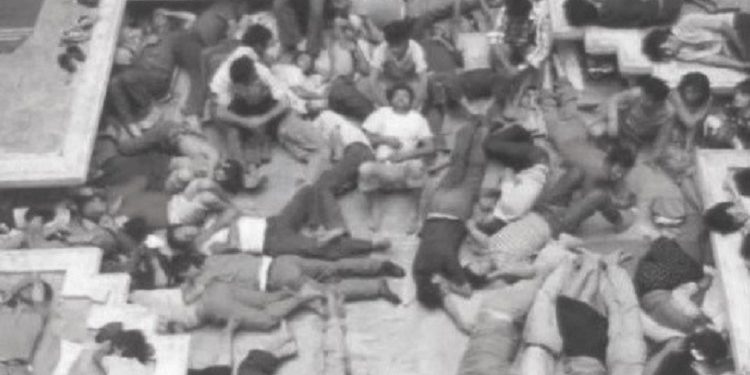
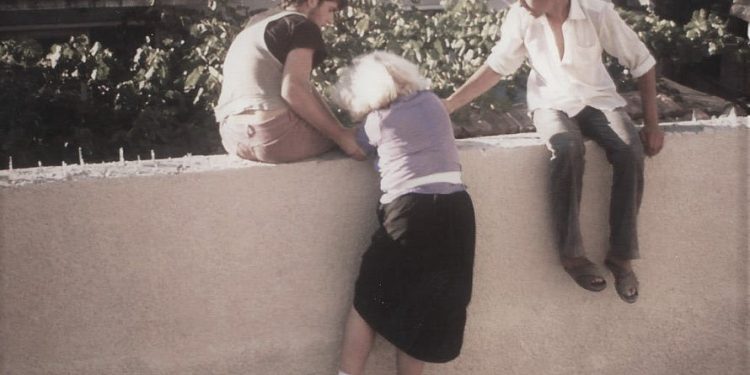
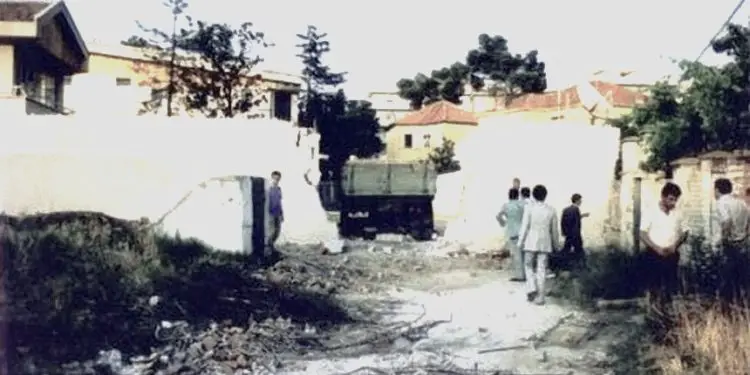
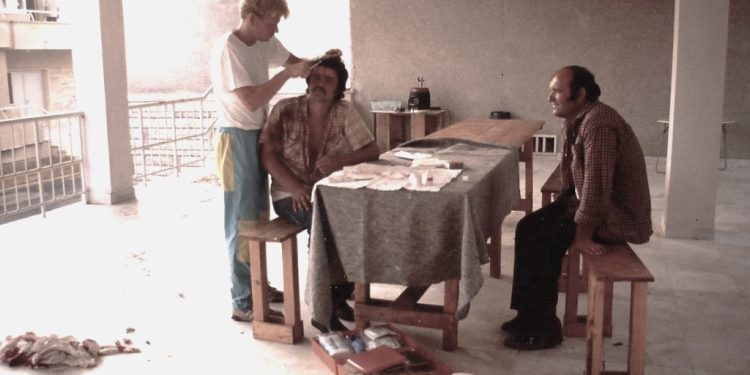
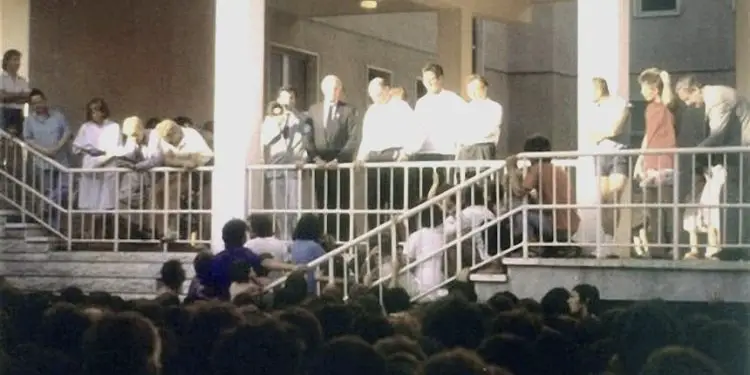
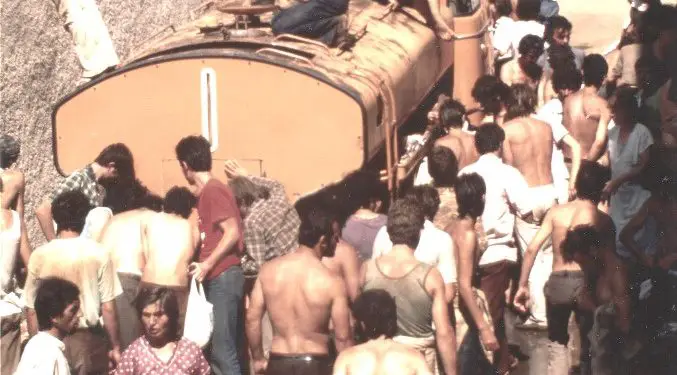


![“The ensemble, led by saxophonist M. Murthi, violinist M. Tare, [with] S. Reka on accordion and piano, [and] saxophonist S. Selmani, were…”/ The unknown history of the “Dajti” orchestra during the communist regime.](https://memorie.al/wp-content/uploads/2026/02/admin-ajax-3-350x250.jpg)
![“In an attempt to rescue one another, 10 workers were poisoned, but besides the brigadier, [another] 6 also died…”/ The secret document of June 11, 1979, is revealed, regarding the deaths of 6 employees at the Metallurgy Plant.](https://memorie.al/wp-content/uploads/2026/02/maxresdefault-350x250.jpg)


